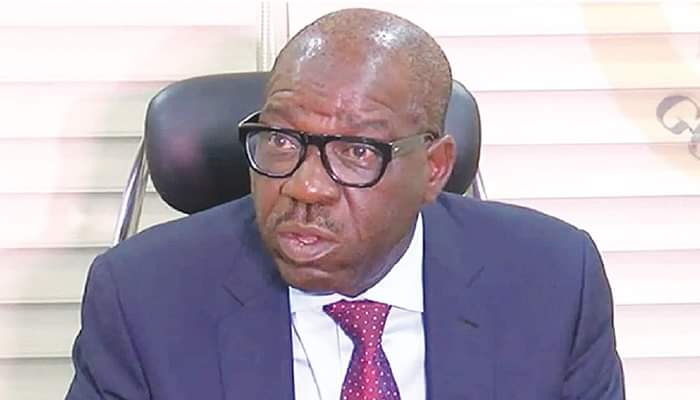Godwin Obaseki, governor of Edo State.
The strained relationships between former governors and the successors they handpick have become legendary in Nigeria. Although it’s common for godfathers and godsons to turn against each other after a period of initial cooperation, it is curious that the tendency to impose chosen successors has become even more entrenched in Nigerian politics, suggesting that few lessons have been learned by the new governors from the former ones.
This trend dates back to conflicts such as the one in Abia State, where current Senator Orji Uzor Kalu handpicked Theodore Orji another current senator as his successor as governor of Abia stater in 2007, later leading to friction when the godson turned against his godfather.
Similarly, in Anambra State, the relationship between Mr. Peter Obi and his chosen successor, Willie Obiano, soured due to undue interference and antagonism between godson and godfather. Generally, such situations can be seen as a form of retribution against the questionable practice of installing successors to maintain influence or enjoy a third term by proxy rather than choosing a successor based on merit and ability to deliver superior performance.
A comparable godfather/godson conflict played out in Kano State, where Dr. Musa Kwankwaso, as governor, chose his former Chief of Staff, Prof. Umar Ganduje, as his successor. Not long after, both men found themselves in a prolonged struggle for power, with one outcome being the destabilisation of the revered Kano emirate. For the first time in the history of this ancient emirate, there are two emirs, each having been deposed and reinstated, reflecting the political power struggles between former governors and their chosen successors.
In 2007, a similar scenario unfolded when then-President Olusegun Obasanjo, in the aftermath of a bitter political fallout with Vice President Atiku Abubakar, who intended to succeed him, did everything possible to prevent Abubakar’s ambition from materialising. Instead, Obasanjo supported former Katsina Governor Umaru Yar’Adua of blessed memory and who is the younger brother of Obasanjo’s political ally, the late Shehu Musa Yar’Adua, to become president.
Tragically, due to severe health issues, President Yar’Adua passed away in 2010, barely two years into his first term, leaving the country in a precarious situation, as this was the first time a sitting president had died under democratic rule. The military dictator, General Sani Abacha had died while serving as a military head of state.
The National Assembly ultimately resolved the constitutional crisis created by that unprecedented situation by invoking the “Doctrine of Necessity,” allowing for a smooth transition of power.
Remarkably, before Yar’Adua’s passing, he was not following OBJ’s agenda. In fact, he had overturned the sale of NNPC refineries to private sector investors, including Dangote, and even reversed the privatisation of the electricity sector—policies that the current administration under President Bola Tinubu appears to be reviving, as seen in recent fuel and gas policies shifting control of energy security to the private sector.
What the examples above underscore is that there is no evidence that engineering surrogates as successors has long term benefits as such perfidous acts always backfire.
As I wish Senator Monday Okpebholo, who has assumed office as governor of Edo State a successful tenure, he should be guided by the experiences of his predecessors in the godfather/godson dynamic that has shaped Edo State over the past few decades. This counsel is to help him draw lessons from history and establish guardrails against any such damaging relationships.
To my senior friend, the distinguished Senator Oshiomhole, I believe he understands the futility of playing the godfather role, having fought against it nearly two decades ago.
As for Obaseki and Ighodalo, who have been left holding the wrong end of the stick in the battle for the control of Dennis Osadebey house, Edo State seat of power, as a democracy advocate l urge them to continue to pursue justice in court to test the law and make democracy sturdier as it develops taproots in Nigeria.
That is one way that we can hand our children “a banner without stain” as captured in a stanza of our national anthem.
Concluded.
Onyibe is an Entrepreneur, Public Policy Analyst and author. He wrote from Lagos,
USA, and a former commissioner in the Delta State. He can be reached via:www.magnum.ng.

